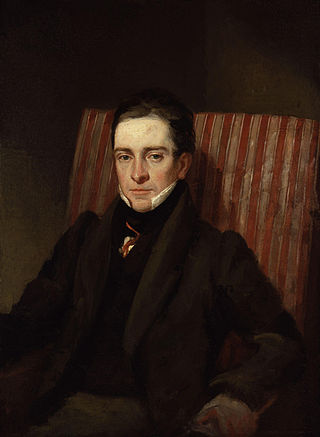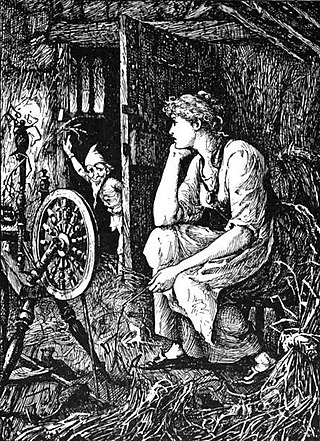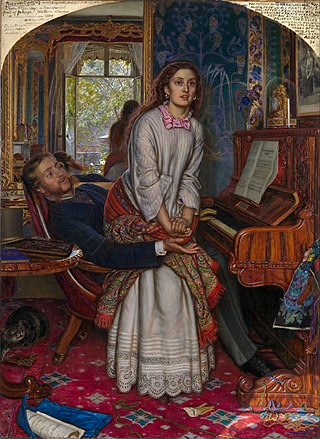
A sewing machine is a machine used to sew fabric and materials together with thread. Sewing machines were invented during the first Industrial Revolution to decrease the amount of manual sewing work performed in clothing companies. Since the invention of the first sewing machine, generally considered to have been the work of Englishman Thomas Saint in 1790, the sewing machine has greatly improved the efficiency and productivity of the clothing industry.

Thomas Hood was an English poet, author and humorist, best known for poems such as "The Bridge of Sighs" and "The Song of the Shirt". Hood wrote regularly for The London Magazine, Athenaeum, and Punch. He later published a magazine largely consisting of his own works. Hood, never robust, had lapsed into invalidism by the age of 41 and died at the age of 45. William Michael Rossetti in 1903 called him "the finest English poet" between the generations of Shelley and Tennyson. Hood was the father of the playwright and humorist Tom Hood (1835–1874) and the children's writer Frances Freeling Broderip (1830–1878).
The putting-out system is a means of subcontracting work, like a tailor. Historically, it was also known as the workshop system and the domestic system. In putting-out, work is contracted by a central agent to subcontractors who complete the project via remote work. It was used in the English and American textile industries, in shoemaking, lock-making trades, and making parts for small firearms from the Industrial Revolution until the mid-19th century. After the invention of the sewing machine in 1846, the system lingered on for the making of ready-made men's clothing.
Caroline Anne Southey was an English poet and painter. She became the second wife of the poet Robert Southey, a prominent writer at the time.

Elizabeth Rundle Charles was an English writer.

Jane West (1758–1852), was an English novelist who published as Prudentia Homespun and Mrs. West. She also wrote conduct literature, poetry and educational tracts.
Anne Steele was an English Baptist hymnwriter and essayist. For a full century after her death, she filled a larger place in United States and British hymnals than any other woman.
"The Elfin Knight" is a traditional Scottish folk ballad of which there are many versions, all dealing with supernatural occurrences, and the commission to perform impossible tasks. The ballad has been collected in different parts of England, Scotland, Ireland, the US, and Canada. As is the case with most traditional folk songs, there have been countless completely different versions recorded of the same ballad. The first broadside version was printed before 1674, and the roots of the song may be considerably older.

"The Lark Ascending" is a poem of 122 lines by the English poet George Meredith about the song of the skylark. Siegfried Sassoon called it matchless of its kind, "a sustained lyric which never for a moment falls short of the effect aimed at, soars up and up with the song it imitates, and unites inspired spontaneity with a demonstration of effortless technical ingenuity... one has only to read the poem a few times to become aware of its perfection".

The Langs' Fairy Books are a series of 25 collections of true and fictional stories for children published between 1889 and 1913 by Andrew Lang and his wife, Leonora Blanche Alleyne. The best known books of the series are the 12 collections of fairy tales also known as Andrew Lang's "Coloured" Fairy Books or Andrew Lang's Fairy Books of Many Colors. In all, the volumes feature 798 stories, besides the 153 poems in The Blue Poetry Book.

Caroline Howard Gilman was an American author. Her writing career spanned 70 years and included poems, novels, and essays.
This article lists all known poems by American author and critic Edgar Allan Poe, listed alphabetically with the date of their authorship in parentheses.

Charlotte Elizabeth Tonna was a popular Victorian English writer and novelist who wrote under the pseudonym Charlotte Elizabeth. She was "a woman of strong mind, powerful feeling, and of no inconsiderable share of tact." Her work focused on promoting women's rights and evangelical Protestantism, as seen in her book Protection; or, The Candle and the Dog, in which the following characteristic quote appears: "Our greatest blessings come to us by prayer, and the studying of God's word." As Isabella A. Owen remarked in 1901, "She was above all else an anti-Romanist, a most protesting Protestant." Harriet Beecher Stowe wrote of her memoir Personal Recollections (1841): "We know of no piece of autobiography in the English language which can compare with this in richness of feeling and description and power of exciting interest."
Frances Freeling Broderip was an English children's writer.

The Awakening Conscience (1853) is an oil-on-canvas painting by the English artist William Holman Hunt, one of the founders of the Pre-Raphaelite Brotherhood, which depicts a woman rising from her position in a man's lap and gazing transfixed out the room's window.

"The Bridge of Sighs" is an 1844 poem by Thomas Hood concerning the suicide of a homeless young woman who threw herself from Waterloo Bridge in London.

Anne Hunter was a salonnière and poet in Georgian London. She is remembered mostly for the texts to at least nine of Joseph Haydn's 14 songs in English. She was the wife of surgeon and anatomist John Hunter, whose anatomical collections in their home eventually formed the basis for the Hunterian Museum. She entertained the leading Bluestockings at their house.

Show Way is a 2005 children's picture book by American author Jacqueline Woodson with illustrations by Hudson Talbott. The book was made into a film in 2012 by Weston Woods Studios, Inc., narrated by the author. It recounts the stories of seven generations of African-Americans and is based on the author's own family history. Show Way was a John Newbery Medal Honor Book in 2006 and was featured in Reading Rainbow that same year in the series finale.

Lillian Rozell Messenger was an American poet from Kentucky. Among her first acknowledged poems were those brought out in a volume entitled, Threads of fate, 1872. Other volumes included Fragments from an old inn, 1885; The Vision of gold, 1886; and The Southern Cross, 1891. "Columbus" was read by Governor John Wesley Hoyt of Wyoming Territory during the patriotic celebration at the Woman's Building, World's Columbian Exposition in Chicago, 1893. "In the heart of America," was read at the Cotton States and International Exposition, in Atlanta, 1895. Messenger contributed many poems to the Louisville Journal, Memphis papers, and the New York Home Journal. Her most ambitious poems were lengthy, narrative ones, with themes such as "Charlotte Corday" and "Penelope, the Wife of Ulysses". Messenger died in 1921.

Eva Munson Smith was an American composer, poet, and author. She was the author of Woman in Sacred Song (1885), a representative work of what women have done in hymnology. She was the author of a large number of temperance songs and other works, which became very popular. Her poems appeared in Poets of America and other standard works. Her best known productions were "Woodland Warblings", "American Rifle Team March", and "I Will Not Leave You Comfortless".















